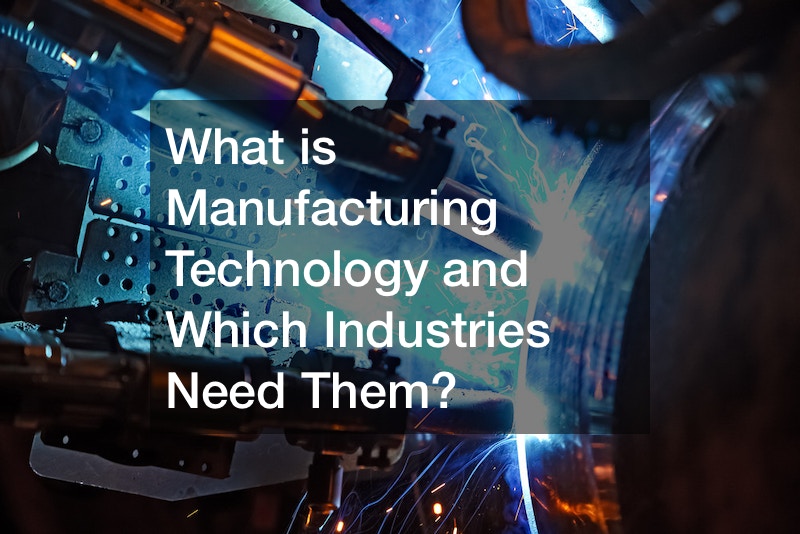What is Manufacturing Technology and Which Industries Need Them?

Manufacturing technology is the driving force behind modern industrial progress, redefining how products are designed, produced, and delivered. This cutting-edge field encompasses a wide range of advanced tools, processes, and systems that optimize manufacturing efficiency and product quality. In this article, we will delve into what is manufacturing technology and explore ten diverse industries that heavily rely on its transformative capabilities.
Automotive Manufacturing

Manufacturing technology, the amalgamation of tools, techniques, and processes, has played a pivotal role in the evolution of the automotive industry. Over the years, advancements in manufacturing technology have revolutionized car production, enhancing efficiency and precision. From Henry Ford’s assembly line innovation to the implementation of computer-aided design and robotics, the automotive sector has witnessed remarkable progress. This well answers the question of what is manufacturing technology.
In the present, the automotive industry faces unique challenges, and one critical aspect is auto salvage. As vehicles become more complex, recycling and reclaiming usable parts have become essential for sustainability. Advanced manufacturing technology facilitates the identification, retrieval, and reconditioning of salvageable components, supporting the circular economy and reducing waste.
Looking ahead, the future of automotive manufacturing technology holds exciting possibilities. The rise of electric vehicles (EVs) and the pursuit of autonomous driving are at the forefront. Manufacturing technology will be instrumental in scaling up EV production and developing robust battery manufacturing processes. Moreover, with autonomous vehicles on the horizon, cutting-edge technologies like lidar, sensor integration, and AI-driven systems will shape the way cars are manufactured to accommodate the unique requirements of self-driving technology.
Firearms Industry
Firearms are intricate devices comprising several essential components and mechanisms. The main components include the barrel, frame, slide (in semi-automatic pistols), and stock (in rifles and shotguns). Within these, various mechanisms interact to facilitate firing and reloading, such as the trigger, firing pin, extractor, and magazine. The complexity of these parts allows firearms to function safely and effectively, making them critical for shooters and enthusiasts to understand.
The manufacturing of firearms involves a series of precise processes to ensure quality and reliability. One significant step is gun coating, where firearms are treated with special coatings to enhance durability, resistance to corrosion, and aesthetic appeal. Popular gun coatings include bluing, parkerizing, and various modern finishes like Cerakote. These coatings not only protect the firearm’s metal surfaces but also contribute to its overall performance and longevity.
What is manufacturing technology and its role in gun manufacturing? Manufacturing technology plays a crucial role in firearm production, enabling the precise manufacturing of components and the integration of various mechanisms. Advanced manufacturing techniques, such as computer numerical control (CNC) machining and additive manufacturing, have revolutionized the industry, improving accuracy and production efficiency.
Soaps and Cosmetics Industry

The soaps and cosmetics industry offers a diverse array of products to cater to various skincare and beauty needs. Within the soap segment, there are bar soaps, liquid soaps, and specialty soaps, with natural and organic variants gaining popularity. In the cosmetics realm, products range from skincare items like moisturizers and serums to makeup products such as lipsticks, foundations, and eyeshadows. With the industry estimated to be worth over $500 billion globally according to Mordor Intelligence, these products continue to evolve to meet ever-changing consumer preferences and demands.
Given the direct contact of soaps and cosmetics with the skin, stringent regulations and safety standards are imperative. Health authorities and regulatory bodies worldwide enforce guidelines concerning product ingredients, labeling, and manufacturing processes. Compliance ensures consumer safety and product efficacy, preventing adverse reactions and health risks.
Manufacturing technology is pivotal in upholding adherence to regulations and safety standards in the soaps and cosmetics industry. It involves advanced processes and equipment designed to produce products with precise formulations and consistent quality. What is manufacturing technology? It encompasses cutting-edge techniques, like computer-controlled systems, to optimize production efficiency and reduce human errors. Cosmetic cream manufacturing equipment, for example, employs sophisticated mixing and blending mechanisms to ensure uniformity in texture and composition.
Pharmaceutical

The pharmaceutical industry’s drug discovery and development processes are intricate and multifaceted. Scientists and researchers identify potential drug candidates through extensive research and testing, followed by preclinical studies to evaluate safety and efficacy. Promising compounds then undergo rigorous clinical trials in human subjects. Throughout these stages, manufacturing technology is key in producing pharmaceutical products at scale.
Wondering what is manufacturing technology in pharmaceuticals? Biotechnology has revolutionized pharmaceutical advancements, particularly in personalized medicine and innovative treatments. One remarkable application is in hair transplant procedures. Biotechnological innovations like follicular unit extraction (FUE) have revolutionized hair restoration techniques, providing more natural results and faster recovery times for patients.
Ethical considerations are paramount throughout the pharmaceutical industry, from research and development to marketing and distribution. Safeguarding patient welfare and ensuring participant informed consent in clinical trials are vital ethical principles. Moreover, the responsible promotion of pharmaceutical products is crucial to avoid misinformation and off-label use. Transparency in disclosing potential conflicts of interest and adherence to regulatory guidelines are essential to maintain public trust.
Construction

The construction industry encompasses a wide array of projects tailored to diverse needs. From residential homes and commercial buildings to infrastructure developments, each project requires specialized expertise. For instance, a garage door screen manufacturer plays a huge role in residential construction by producing innovative solutions to protect garages from insects and debris while offering enhanced ventilation and accessibility.
Construction projects rely on a vast array of tools and equipment to execute various tasks efficiently. Basic hand tools such as hammers, saws, and screwdrivers are essential for manual work, while heavy machinery like excavators, bulldozers, and cranes facilitate earthmoving and heavy-lifting operations. Advanced tools such as laser levels and drones aid in precision measurements and surveying, streamlining construction processes and ensuring accurate results.
What is manufacturing technology’s role in the construction industry? Manufacturing technology is used in construction companies to optimize their processes, enhance productivity, and produce high-quality components. It encompasses a range of cutting-edge tools and methods that improve manufacturing efficiency and precision. For instance, a blast resistant commercial glass manufacturer employs manufacturing technology to produce glass products capable of withstanding explosions, enhancing the safety and resilience of buildings in high-risk areas.
Food and Beverage
The food and beverage industry holds immense significance as a crucial global sector that fulfills essential human needs. The industry accounts for a substantial share of the world’s economy, providing employment to millions and contributing to GDP growth. With the rising global population and changing dietary preferences, the industry faces increasing demands for diverse, safe, and high-quality food and beverage products.
Manufacturing technology plays a significant role in the food and beverage industry by optimizing production processes and enhancing efficiency. Ever wondered what is manufacturing technology in the food and beverages industry? It encompasses innovative tools, equipment, and processes that streamline food processing and beverage manufacturing.
Industrial equipment rental provides companies with access to specialized machinery without the burden of ownership costs, enabling greater flexibility and cost-effectiveness in production. Food safety and quality control are paramount in the food and beverage industry to protect consumer health and ensure product consistency.
Strict adherence to hygiene standards, proper handling, and storage practices mitigate the risk of foodborne illnesses. Robust quality control measures, including lab testing, sensory evaluation, and adherence to regulatory standards, are essential to maintain product integrity. Companies invest in sophisticated food safety management systems and certifications to uphold their reputation and build consumer trust.
Toys Manufacturing
Ever asked yourself what is Manufacturing technology and what its role is in the toy industry? Well, from initial design to final assembly, manufacturing technology streamlines various stages of toy manufacturing. Computer-aided design (CAD) software enables precise modeling, allowing designers to create intricate and innovative toy concepts. State-of-the-art machinery and automation in toy manufacturing facilitate efficient production, ensuring consistency and scalability.
The incorporation of manufacturing technology offers numerous advantages to toy manufacturers. It significantly reduces production time and costs while enhancing product quality and design complexity. Automation streamlines repetitive tasks, leading to increased productivity and minimized errors. With the ability to quickly prototype and iterate designs using manufacturing technology, toy companies can bring new products to market faster and remain competitive in the industry.
The toy industry continually evolves with changing consumer preferences and technological advancements. An emerging trend is the utilization of tool rental services by toy manufacturers. These services provide access to specialized equipment without the need for heavy capital investments, allowing smaller companies to compete with larger players. Furthermore, toy manufacturers are incorporating smart technology and digital features into toys, catering to the growing demand for interactive and educational play experiences.
Office Supplies
Office supplies enable smooth operations and productivity in any workplace. These items encompass a wide range of products, including writing materials like pens and paper, organizational tools like staplers and file folders, and presentation materials like whiteboards and markers. Also, offset printing equipment are important for producing high-quality printed materials, such as business cards, letterheads, and promotional materials, supporting effective communication and branding within the office environment.
Efficient supply chain management is crucial for ensuring a steady and cost-effective flow of office supplies. Businesses often engage in bulk purchasing to leverage economies of scale, reducing costs and maintaining sufficient stock levels. Establishing partnerships with reliable suppliers and streamlining procurement processes contributes to a smooth and uninterrupted supply chain. Efficient inventory management and tracking systems also aid in preventing stockouts and minimizing wastage, ensuring that essential office supplies are readily available whenever needed.
Manufacturing technology is instrumental in the production of office supplies. What is manufacturing technology? It encompasses advanced tools, techniques, and processes that optimize manufacturing efficiency and product quality. For example, the manufacturing of office supplies like pens, paper, and adhesive products involves various automated processes that enhance consistency and precision. Embracing modern manufacturing technology also enables the creation of sustainable and eco-friendly office supplies, meeting the growing demand for environmentally responsible products.
Energy Industry
The energy industry encompasses a wide range of tasks aimed at meeting the world’s growing demand for power. These tasks include energy generation, transmission, distribution, and consumption. From harnessing energy sources to delivering electricity to homes and businesses, the industry is key in supporting modern society’s functioning.
Energy generation and management rely on a variety of tools and technologies to extract, convert, and distribute power efficiently. In the context of renewable energy, solar panels, and wind turbines are common tools for electricity generation from the sun and wind, respectively. For fossil fuel-based energy, drilling rigs and extraction equipment are used to obtain oil and gas reserves. directional boring equipment is essential in laying underground utilities and pipelines for energy transmission, minimizing surface disruption and environmental impact.
So, what is manufacturing technology in the energy industry? Manufacturing technology is pivotal in the energy industry, enabling the development and deployment of advanced equipment and systems. It helps in the fabrication and maintenance of energy generation technologies, such as wind turbine components, solar panels, and power plant machinery. Besides, manufacturing technology supports energy storage solutions, improving grid stability and enabling the integration of intermittent renewable energy sources.
Electronics
Electronic manufacturing processes encompass a series of steps to produce electronic devices efficiently and reliably. From initial design to final assembly, these processes involve the fabrication of printed circuit boards (PCBs), component mounting, soldering, and quality testing. Surface mount technology (SMT) and through-hole assembly are common techniques employed to mount components onto PCBs.
Artificial Intelligence (AI) has transformed various industries, and electronics is no exception. In electronics, AI is revolutionizing product design, manufacturing, and performance optimization. AI algorithms assist in circuit design and simulation, enabling engineers to develop more efficient and high-performance electronic components. A good answer to what is manufacturing technology in electronics.
As electronics continue to shape modern life, ethical considerations become increasingly important. The manufacturing technology utilized in electronic production has environmental implications, leading to electronic waste generation. Proper electronic waste management and recycling are essential to minimize the impact on the environment and human health.
The article sheds light on the significance of manufacturing technology across various industries. What is manufacturing technology? It encompasses a diverse array of advanced tools, techniques, and processes that drive innovation, efficiency, and productivity. Its transformative impact on production processes, product quality, and overall efficiency has propelled industries into new realms of possibility. As industries evolve, no doubt the role of manufacturing technology will continue to be at the forefront of progress and advancement.


